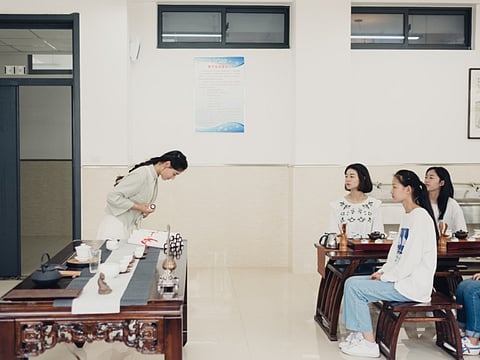Sunny, wise and perfect
A college in China is teaching women how to be a correct fit in the ‘new era’ of President Xi Jinping

Zhenjiang, China: At a college in southern China, Duan Fengyan is studying to be an accountant. She is also getting lessons in how to be a woman in the time of President Xi Jinping.
In a course launched in March, not long after China abolished presidential term limits, Zhenjiang College and the All-China Women’s Federation have been teaching female students how to dress, pour tea and sit just so — all in the name of Xi’s “new era.”
“You must sit on the front two-thirds of the chair — you cannot occupy the whole chair,” said Duan, 21, demonstrating. “Now, hold in your belly, relax your shoulders, legs together, shoulders up.”
The class, offered only to female students, aims to develop “wise,” “sunny” and “perfect” women, where wisdom comes from studying Chinese history and culture, sunniness from oil painting and etiquette classes, and perfection from the application of (never too much) make-up.
The college launched the New Era Women’s School to heed Xi’s call for education in traditional Chinese culture, to help women compete in the job market, said Sheng Jie, who runs the program — but also to prepare them for domestic roles. “Women’s family role is more important now,” she said.
Forty years into China’s great economic transformation, Chinese women are, on average, healthier, wealthier and better educated than ever before, but they are losing ground relative to men.
“Our traditional culture is filled with restrictions on — and the oppression of — women,” said Lu Ping, a prominent Chinese feminist who ran a website that was recently censored. “Can we push women back into the traditional roles?”
In the halls and classrooms of Zhenjiang College, self-improvement is indeed women’s work.
There is no equivalent course for men.
Both teachers and students said that young women should constantly seek to improve their “quality” to stay competitive. Success requires constant “self-cultivation” — not a bad thing when it applies to all genders.
Li Ziyi, a 19-year-old studying early-childhood education, said she’d been taught years ago that, for women, good grades are not enough. “When I was in secondary school, my teacher told us that the college entrance exam is the last fair exam in your life, because it doesn’t look at your face,” she said.
Her classmate, Wang Caidie, 18, a nursing student, said female nurses are advised to wear “light make-up” to look professional, while male classmates are given no instructions at all.
The double standard was not lost on them, but neither were the lessons in how to sit, stand and serve tea — which they considered fun and useful.
“Even before the job interview starts, we will deliberately pay more attention to how we sit, how we stand up. That is our advantage compared to those who haven’t attended these classes,” Duan said.
‘Not a feminist’
Sheng, the programme director, declined to talk much about women’s rights — she is a teacher, not a feminist, she said.
Her goal is to teach young women what they need to know and, in so doing, help the nation. “The country is emphasising traditional culture, so we are providing courses,” she said.
“This is a new era. History is moving in a better direction.”
Lessons
Last year, news broke that a company in northern China was operating a “traditional culture school” where women were told to “shut your mouths and do more housework” and practiced bowing to their husbands.
“Don’t fight back when beaten. Don’t talk back when scolded. And, no matter what, don’t get divorced,” a female teacher there said, according to footage published by Beijing’s Pear Video.
“Women should just stay at the bottom level of the society and not aspire for more,” another instructor said.
When the story went viral, local officials said its message violated “socialist core values” and called for an investigation.
But Feng Yuan, a Beijing-based anti-domestic-violence campaigner, said the focus on wifely virtue persists - and is promoted.
“At the moment, we only see emphasis on women’s family role,” she said. “There’s never any emphasis on men’s role.”



